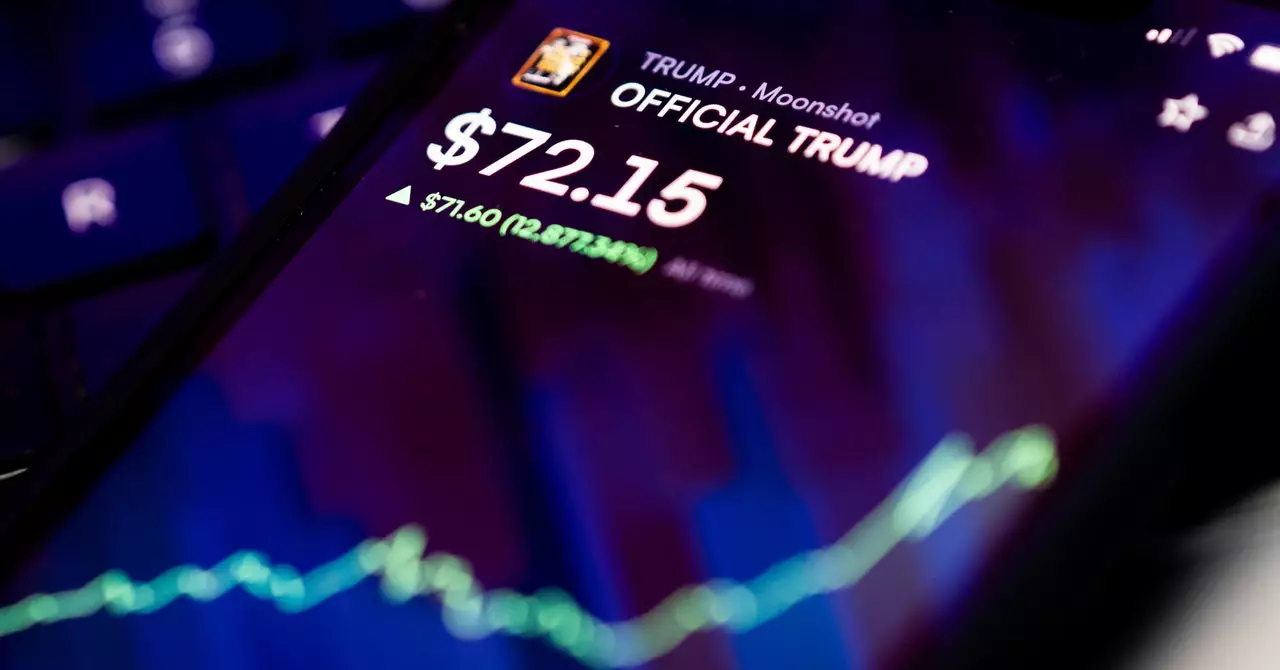In recent years, the intersection of cryptocurrency and politics has generated significant discourse, especially as new tokens emerge tied to political figures. Of particular interest is the TRUMP coin, which poses various risks not just to individual investors but also to the ethical fabric of political fundraising and engagement. This article delves into the mechanics of TRUMP coin and its implications, particularly in the light of criticisms from industry experts and the unsettling practices associated with memecoins.
The TRUMP coin, as articulated by Jacob Silverman in his work “Easy Money: Cryptocurrency, Casino Capitalism, and the Golden Age of Fraud,” exemplifies the archetype of a ‘pump-and-dump’ scheme. This illicit mechanism typically involves individuals or entities holding a significant amount of a cryptocurrency, strategically promoting it to inflate its value, and subsequently selling off their holdings, often to the detriment of later investors. Silverman’s cautionary notes about the potential for an insider ownership concentration of up to 80 percent necessitate serious scrutiny. When insiders control such a large share, the risk of a swift market crash following a mass sell-off becomes alarmingly high.
Such practices not only raise flags about market manipulation but also cast a shadow over the reputational integrity of both the token and its supporters. As the volatility of the market demonstrates, naïve investors could find themselves in significant financial jeopardy, potentially losing their investments with little recourse.
The wider cryptocurrency market is not immune to the ramifications of the TRUMP coin. In an unexpected twist, the launch of the MELANIA coin—a separate venture featuring Melania Trump—has directly impacted the value of TRUMP tokens, causing a drop of approximately 50 percent in its market price. This decline illustrates not just the inherent volatility in the world of cryptocurrency but also points to the interconnectedness of various political memecoins in a volatile ecosystem.
The broader market sentiment regarding political memecoins has grown cautious, with tokens like MAGA, MAGA Hat, and other Trump-inspired digital currencies witnessing a significant plunge in value. Those who invested in these tokens as a show of support for Trump have seemingly experienced the consequences of an unpredictable market, raising questions about the ethics of such investments and their potential misuse.
Steven Steele, the marketing director for the MAGA token, has voiced his concerns over the appropriateness of an official TRUMP coin, suggesting it resembles an ideal example of a ‘money-grab’ in the political arena. The implications of such a sentiment are stark; they indicate a loss of trust among core supporters who may feel exploited under false pretenses. Furthermore, if prominent figures like Trump engage in cryptocurrency ventures primarily for financial gain, they risk alienating constituents who view them as leaders rather than marketers.
Moreover, the ethical implications extend beyond financial losses, as Silverman warns that investments in TRUMP coin could facilitate indirect methods of influence. This raises the specter of bribery and exerting political pressure through financial channels that lack transparency, challenging the very essence of democratic engagement. The possibility of silent transactions weakening accountability in leadership positions is troubling and suggests a need for stricter regulations in political fundraising methods.
Interestingly, Trump’s relationship with cryptocurrencies has undergone a remarkable transformation since his presidency. Initially dismissing cryptocurrencies like Bitcoin as fraudulent, he now positions himself as a potential benefactor and “crypto president” in an attempt to secure favor among the crypto community. This shifting landscape has seemed sudden, especially as crypto advocates tossed considerable financial support towards pro-crypto political action committees in the lead-up to the 2024 elections.
At a conference in Nashville, Trump promised to transform the U.S. into the “crypto capital of the planet,” a captivating vision that raises numerous doubts considering the tumultuous history associated with crypto ventures led by political figures. Furthermore, the recent launch of the Trump family’s crypto business, World Liberty Financial, has been met with skepticism, leaving questions about its long-term sustainability and potential repercussions for investors.
The reality is that the landscape of political memecoins, particularly the TRUMP coin, continues to evolve in ways that could have far-reaching implications. The interplay between politics and cryptocurrency raises fundamental questions about ethics, leadership, and investor accountability. As the cryptocurrency landscape becomes more intertwined with election cycles, the need for clarity and regulation grows increasingly essential.
A failure to address the potential downsides associated with political memecoins could not only lead to financial ruin for unsuspecting investors but also further erode public trust in political institutions. The challenge ahead lies in navigating this new frontier responsibly, ensuring that both the financial and ethical aspects of merging cryptocurrency and politics are adequately considered. As this phenomenon unfolds, it becomes vital for regulators, investors, and political figures alike to approach these developments with caution and accountability.

